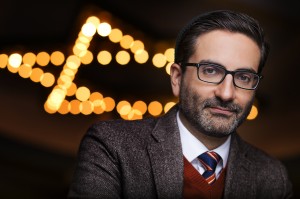Dr. Ezekiel Emauel, the well-known bioethicist and brother of the mayor of my town, argued recently in an essay in the Atlantic Monthly that 75 is the perfect age to die. After that, he said, most people have little to contribute to society and are a burden rather than a benefit.
I can think of few less Jewish ideas than this. It is not only heartless. It is wrong. My grandfather took me to Israel when he was 81 and changed my life. Each of us probably has similar stories.
When it comes to defining our contribution to the world, what matters most is not how many years we will live but how we use the years we have. To put it in physical terms, what matters most is not how efficiently the heart is beating, but how wide it stretches.
The Heart is All That Matters
If we were to open a Hebrew Torah scroll, we would see that its very last Hebrew letter is Lamed. Then if we rolled it all the way back to the beginning, we would see that its very first letter is Bet. When you put those two letters together, you can the word Lev. Lev means heart.
The heart is literally the end and beginning of the entire Torah. To live by the Torah we live from heart.
Taken to its extreme, Dr. Emanuel’s view distorts our understanding of value. Science relies only on what we see—what we can hold and touch and measure–and that is severely limiting. We can see the size of the new iPhone. We can see the sparkle of a new watch. We can see the color of someone’s hair or the wrinkles on their skin.
But we can’t see the size of our heart. We can’t see the capacity of our dreams. The Jewish sages would agree with the wonderful French writer Antoine de St. Exupery who said, “It is only with one’s heart that one can see clearly. What is essential is invisible to the eye.”
The Heart Makes Us Human
What makes the heart so extraordinary is that the inevitably pains of age¬–the slowing down, the loss of skills and energy–does not drown us. The can ennoble us. They can deepen us. They can make us fully alive.
The heart can contain the pain, the brokenness, the frustrations of life alongside its joys, loves, and excitement. The heart can see more clearly than eye. It feels pain more deeply than the nerves. It can heal more fully than the skin. And there are no age limits when it comes to the gifts the heart can give.
It may not always produce new books or let us climb Mount Kilimanjaro, the criteria by which Dr. Emanuel seems to measure the value of life. It may not always let us run a marathon. But it can lift us out of ourselves. It can link us to generations past, present and future.
Poet Philip Larkin said what will survive of us is love. We might also say what lets us survive—physically, emotionally, spiritually, existentially—is the heart. And it can last well past 75.
Can We Choose When To Die? Discover What the Major Religions Believe


